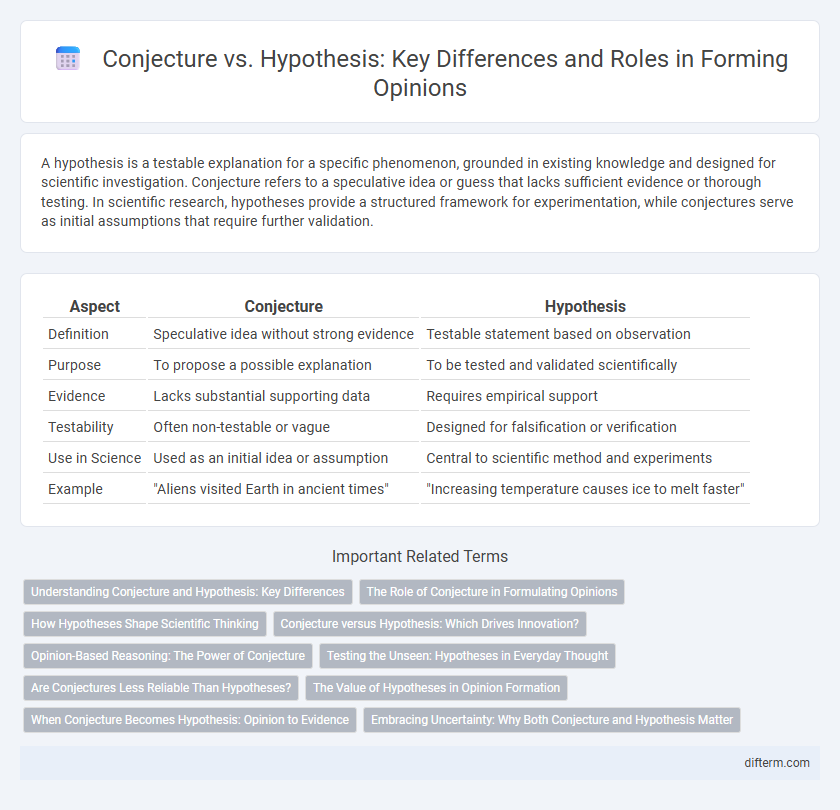A hypothesis is a testable explanation for a specific phenomenon, grounded in existing knowledge and designed for scientific investigation. Conjecture refers to a speculative idea or guess that lacks sufficient evidence or thorough testing. In scientific research, hypotheses provide a structured framework for experimentation, while conjectures serve as initial assumptions that require further validation.
Table of Comparison
| Aspect | Conjecture | Hypothesis |
|---|---|---|
| Definition | Speculative idea without strong evidence | Testable statement based on observation |
| Purpose | To propose a possible explanation | To be tested and validated scientifically |
| Evidence | Lacks substantial supporting data | Requires empirical support |
| Testability | Often non-testable or vague | Designed for falsification or verification |
| Use in Science | Used as an initial idea or assumption | Central to scientific method and experiments |
| Example | "Aliens visited Earth in ancient times" | "Increasing temperature causes ice to melt faster" |
Understanding Conjecture and Hypothesis: Key Differences
Conjecture is an informed guess based on limited evidence, often serving as a starting point in the scientific process, while a hypothesis is a testable statement derived from observations and existing knowledge. A hypothesis requires empirical validation through experimentation or data analysis to be supported or refuted. Understanding this distinction is crucial for effective research design and advancing scientific knowledge.
The Role of Conjecture in Formulating Opinions
Conjecture plays a crucial role in formulating opinions by allowing individuals to generate initial ideas based on limited evidence, driving curiosity and exploration. Unlike hypotheses, which require testable predictions and empirical validation, conjectures serve as flexible, speculative premises that inspire further inquiry and discussion. Embracing conjecture fosters creative thinking and opens pathways for diverse perspectives before reaching definitive conclusions.
How Hypotheses Shape Scientific Thinking
Hypotheses provide a structured framework that guides scientific inquiry by offering testable predictions based on existing knowledge, enabling researchers to design experiments with clear objectives. Unlike conjectures, which are speculative and lack empirical backing, hypotheses drive the accumulation of evidence through systematic observation and experimentation. This disciplined approach not only refines scientific theories but also facilitates the advancement of knowledge by distinguishing plausible explanations from mere speculation.
Conjecture versus Hypothesis: Which Drives Innovation?
A conjecture sparks innovation by encouraging bold, exploratory ideas without requiring immediate proof, fostering creative breakthroughs. In contrast, a hypothesis structures innovation through testable predictions that refine and validate concepts systematically. Balancing conjecture's visionary potential with hypothesis-driven rigor accelerates scientific progress and technological advancement.
Opinion-Based Reasoning: The Power of Conjecture
Opinion-based reasoning leverages conjecture as a dynamic tool for exploring ideas beyond established facts, fostering innovative thinking and hypothesis generation. Conjectures, while unproven, stimulate critical dialogue and open avenues for testing and refinement in scientific and philosophical contexts. This approach highlights the importance of valuing intuitive insights alongside empirical evidence to advance knowledge and understanding.
Testing the Unseen: Hypotheses in Everyday Thought
Hypotheses serve as the backbone for testing unseen possibilities in everyday thought, offering a structured approach to validate assumptions through empirical evidence. Unlike conjectures, which are often speculative and subjective, hypotheses are formulated with the intent to be tested and potentially falsified, grounding abstract ideas in measurable reality. This distinction highlights the critical role of hypothesis-driven thinking in navigating uncertainty and refining knowledge through observation and experimentation.
Are Conjectures Less Reliable Than Hypotheses?
Conjectures are often regarded as less reliable than hypotheses because they stem from incomplete evidence and rely heavily on intuition rather than systematic investigation. Hypotheses, by contrast, are formulated through rigorous observation and designed for empirical testing, which enhances their credibility. This distinction underscores the importance of methodological rigor in advancing scientific understanding and reducing uncertainty.
The Value of Hypotheses in Opinion Formation
Hypotheses provide a structured framework for testing ideas and shaping opinions through evidence-based reasoning. Unlike conjectures, which rely on speculation, hypotheses demand critical evaluation and empirical support, fostering more reliable conclusions. This disciplined approach enhances the credibility and depth of opinion formation, making it essential in both scientific inquiry and everyday decision-making.
When Conjecture Becomes Hypothesis: Opinion to Evidence
A conjecture transforms into a hypothesis when it moves beyond mere speculation and gains preliminary support through observable evidence or logical reasoning. This shift is critical in scientific inquiry, marking the transition from an intuitive guess to a testable statement. Evaluating conjectures with empirical data ensures hypotheses are grounded in reality, facilitating systematic validation and advancing knowledge.
Embracing Uncertainty: Why Both Conjecture and Hypothesis Matter
Conjecture drives innovative thinking by allowing the exploration of ideas without immediate proof, fostering creativity and opening new research avenues. Hypotheses structure this uncertainty into testable predictions, enabling systematic inquiry and validation within scientific methods. Embracing both conjecture and hypothesis acknowledges their complementary roles in advancing knowledge, balancing imagination with empirical rigor.
conjecture vs hypothesis Infographic

 difterm.com
difterm.com